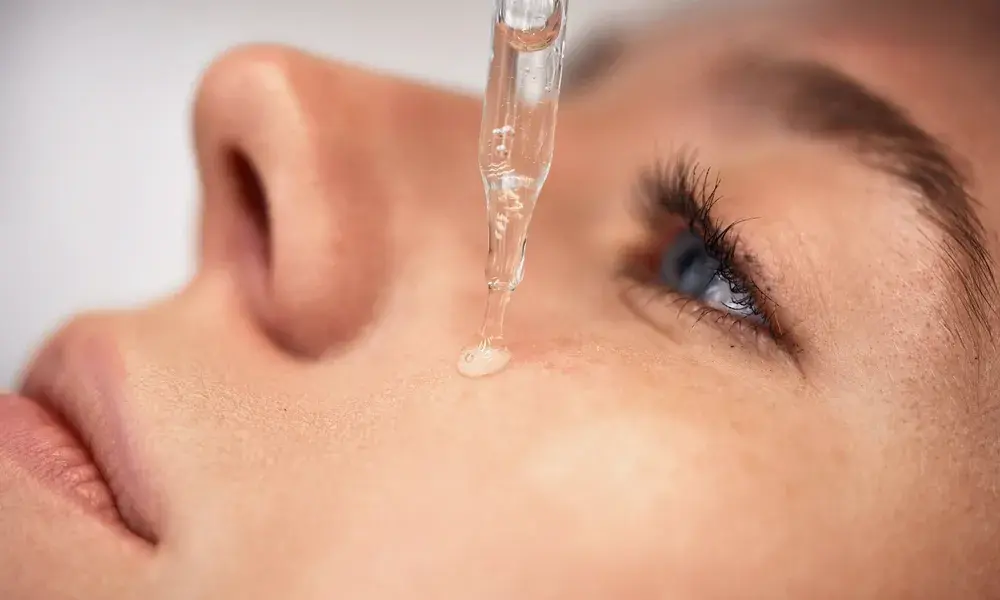What Is Niacinamide?
Niacinamide, or nicotinamide, is a water-soluble form of vitamin B3. Your body can't produce this essential nutrient independently, so you have to get it through your diet or other sources. Niacinamide food sources include meat, fish, nuts and legumes, like beans and lentils.
To clear up the confusion between niacin vs. niacinamide, know that they're both forms of vitamin B3 with slightly different chemical formulas. Niacin is the simplest form of vitamin B3 and the precursor to niacinamide. Like niacinamide, niacin has many benefits, but it's much less common in topical skincare products.
Over time, niacinamide has quietly emerged as a skincare favorite, celebrated for its wide-ranging benefits. But what does niacinamide do?
What Are the Uses of Niacinamide?
So, what is niacinamide used for? Niacinamide benefits many aspects of skin health. Here's why dermatologists and skincare enthusiasts rave about this remarkable compound.
Hydrates and Protects
Niacinamide helps hydrate your skin by increasing ceramide and fatty acid production — both essential for strengthening your skin's barrier. The result? Hydrated, healthy-looking skin.
A strong skin barrier also protects your skin from daily environmental aggressors, like pollutants and ultraviolet (UV) rays, and keeps essential skin moisture from escaping (known as transepidermal water loss). Plus, its antioxidant superpowers fight off free radicals — the prime culprits behind premature skin aging.
Improves Texture
Niacinamide supports an overall smoother, plumper texture and minimizes the appearance of fine lines and wrinkles.
Evens Skin Tone
Dealing with dark spots or uneven skin tone? Niacinamide brightens your skin. This helps even skin tone over time, supporting a bright, balanced complexion.
Where Does Niacinamide Come From?
The story of niacinamide begins in the early 20th century with the discovery of vitamin B3, niacinamide's parent compound. Initial research aimed to tackle pellagra, a disease characterized by dermatitis and dementia, attributed to niacin deficiency. But it wasn't long before vitamin B3's skincare potential came into focus, leading researchers to identify niacinamide and its unique benefits.
Today, niacinamide is a key ingredient in many skincare products, with concentration crucial to effectiveness.
How To Incorporate Niacinamide Into Your Skincare Routine
You can find niacinamide in cleansers, sunscreens, moisturizers and serums, so it's easy to add to your daily routine. Ready to give your skin a glow up with niacinamide? Here's your comprehensive guide to getting started.
Pick Your Potion
Choose a niacinamide product that meets your skin's needs. For a powerful pairing of glycerin, hyaluronic acid and niacinamide, work your way up to Neutrogena® Hydro Boost+ Niacinamide Serum, formulated with 10% niacinamide and without fragrance, dyes, phthalates or parabens to go easy on sensitive and acne-prone skin. To focus on refining skin texture, opt for Neutrogena Stubborn Texture® Niacinamide Face and Neck Serum in your morning routine.
Ease Into It
Niacinamide is generally well tolerated, but it's best to start with lower concentrations and gradually increase as your skin adjusts.
Layer Like a Pro
Niacinamide plays well with most ingredients. So, when it comes to niacinamide and retinol, niacinamide and vitamin C, and hyaluronic acid and niacinamide, you're good to go. In terms of order, layer products from lightest to heaviest (toner, serum, moisturizer, sunscreen).
Listen to Your Skin
Keep an eye on how your skin responds. Look for signs of happier, healthier skin — think brighter, smoother and more even-toned, not red, itchy or tight. Again, niacinamide is generally well tolerated, but anyone can react to certain skincare ingredients. Start with a patch test before applying any new product all over your skin.
Apply Sunscreen
Niacinamide works alongside sunscreen to shield your skin from UV rays. Use a broad-spectrum sunscreen with SPF 30 or higher every day to protect your skin from the sun.
Use Consistently
Consistency is key when using niacinamide. Apply it as part of your regular skincare routine — morning, night or both, depending on product type and skin tolerance — for best results.
Niacinamide isn't just a fleeting trend. It's a true classic, offering benefits that go beyond a quick fix to support your skin's health in the long haul. So, if you haven't yet welcomed niacinamide into your skincare routine, now's the perfect time to introduce your skin to this amazing ally. Your skin will thank you!





